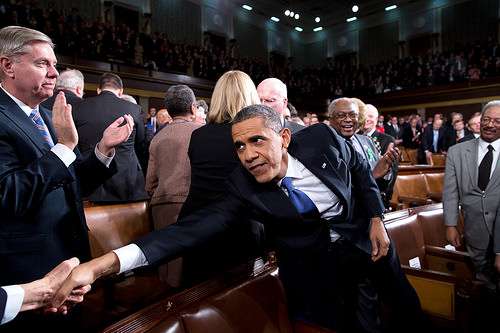The Myth of Obama's Centrism
Obama's quest for a "balanced approach" is the lifeblood of his political success--and also its biggest myth.
Barack Obama's quest for a "balanced approach" is the lifeblood of his political success -- and also its biggest myth. Witness the coverage of the purportedly centrist president's 2014 budget proposal.
"Obama sends Congress $3.77T spending plan, riles both sides," says one prominent headline; "President Obama's risky 'goodwill' gambit," begins another fairy tale. "Obama Budget Is Meant to Draw GOP to the Table," claims The New York Times.
Nearly every story stresses that the budget has drawn critics from both the left and the right. Obama, you see, is so moderate he's willing to wrangle with the socialist Sen. Bernie Sanders from Vermont (and his petition signed by a couple of million folks who wouldn't know the difference between a "chained consumer price index" and a Chick-fil-A chicken sandwich) and Republicans. So, balance.

President Obama's budget would spend $160 billion more in 2014 than the Congressional Budget Office's base line had even imagined. No tax reform. No genuine entitlement reform. His 10-year, $1.8 trillion "deficit reduction plan" is predicated on doing away with $1.2 trillion in sequester cuts and making it up by taxing us directly or allowing tax hikes to pass through various industries. It is a massive zero-sum fallacy masquerading as a budget.
Nearly every piece of journalism means to frame Obama as a rational broker residing somewhere between Senate Democrats and House Republicans, when in fact, he offers only meager concessions—or, more precisely, a meager concession—meant to compel impotent Republicans into surrender.
Take all this excitable talk about the "chained CPI" concession, which, if I'm reading my media correctly, is to be treated with the deference of an authentic compromise. A chained CPI lowers the cost-of-living adjustments for senior citizens who receive Social Security by switching to an index that grows more slowly—based on the idea that Americans have the sense to be more prudent with their purchases when things get more expensive. Republicans may like the idea, but according to the CBO, switching to a chained CPI would raise taxes by about $124 billion over the next decade. Your personal exemptions, your deductions, earned-income and child tax credits, etc., would all be adjusted annually for the CPI.
What do you get in return? As Peter Orszag, Obama's former Office of Management and Budget director, explains it, the savings on a chained CPI has been diminishing for years. So less than $150 billion would be saved. The tax hike would be nearly as big as the benefit cut. Which, I suppose, is a "balanced approach" if a person believes that Washington is entitled to all your earnings and works backward from that premise.
What else? Among other things, a death tax increase. It has new restrictions on individual retirement account and 401(k) plans. New taxes on energy. Rosy assumptions about Obama's disastrous economy that make it all work. MSNBC may talk about collective child rearing, but it's Obama who's creating a universal pre-K by taxing smokers. (Let's hope they won't forget to set aside funding for those pro-smoking PSAs to ensure the sustainability of the program.)
Inevitably, Republicans will have to reject Obama's budget—which was, incidentally, delivered two months late—because it is stuffed with tax increases that would mean political suicide. Republicans will be cast as obstructionists, when in fact, there sit Senate and House budgets entirely ignored by the White House. Maybe the president is offering voters the type of spending they desire -- though, looking at polls of their attitudes on taxes, that's debatable -- but the media do the public a disservice by framing his proposal as moderate or, even more dishonestly, casting Obama as a great compromiser.


Show Comments (23)